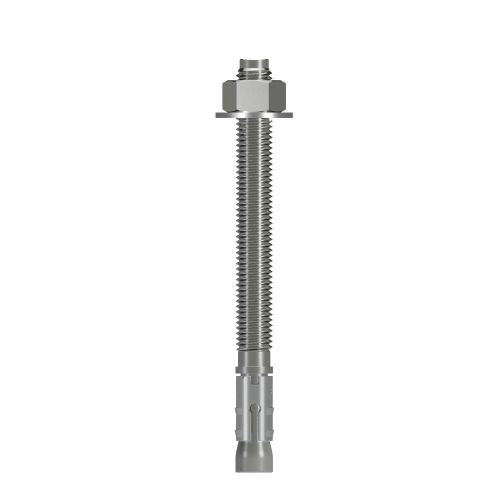Product Overview
STB2-757004SS Strong Bolt 2
A wedge-type expansion anchor designed for optimal performance in cracked and uncracked concrete as well as uncracked masonry. The Strong-Bolt 2 is available in carbon steel, Type 304 and Type 316 stainless steel.
Key Features:
Code listed under IBC/IRC for cracked and uncracked concrete per ICC-ES ESR-3037
Code listed under IBC/IRC for masonry per IAPMO UES ER-240
Qualified for static and seismic loading conditions (seismic design categories A through F)
Suitable for horizontal, vertical and overhead applications
Qualified for minimum concrete thickness of 3 1/4", and lightweight concrete-over-metal deck thickness of 2 1/2" and 3 1/4"
Standard (ANSI) fractional sizes: fits standard fixtures and installs with common drill bit and tool sizes
Tested per ACI355.2 and AC193
Installation:
Drill a hole in the base material using a carbide drill bit the same diameter as the nominal diameter of the anchor to be installed. Drill the hole to the specified minimum hole depth, and blow it clean using compressed air. (Overhead installations need not be blown clean.)
Alternatively, drill the hole deep enough to accommodate embedment depth and dust from drilling.
Assemble the anchor with nut and washer so the top of the nut is flush with the top of the anchor. Place the anchor in the fixture, and drive it into the hole until the washer and nut are tight against the fixture.
Tighten to the required installation torque.
Caution:
Do not use an impact wrench to set or tighten the Strong-Bolt 2 anchor
Oversized holes in the base material will make it difficult to set the anchor and will reduce the anchor's load capacity Assemble the anchor with nut and washer so the top of the nut is flush with the top of the anchor. Place the anchor in the fixture, and drive it into the hole until the washer and nut are tight against the fixture.
Tighten to the required installation torque.
Caution
Do not use an impact wrench to set or tighten the Strong-Bolt 2 anchor
Oversized holes in the base material will make it difficult to set the anchor and will reduce the anchor's load capacity
A wedge-type expansion anchor designed for optimal performance in cracked and uncracked concrete as well as uncracked masonry. The Strong-Bolt 2 is available in carbon steel, Type 304 and Type 316 stainless steel.
Key Features:
Code listed under IBC/IRC for cracked and uncracked concrete per ICC-ES ESR-3037
Code listed under IBC/IRC for masonry per IAPMO UES ER-240
Qualified for static and seismic loading conditions (seismic design categories A through F)
Suitable for horizontal, vertical and overhead applications
Qualified for minimum concrete thickness of 3 1/4", and lightweight concrete-over-metal deck thickness of 2 1/2" and 3 1/4"
Standard (ANSI) fractional sizes: fits standard fixtures and installs with common drill bit and tool sizes
Tested per ACI355.2 and AC193
Installation:
Drill a hole in the base material using a carbide drill bit the same diameter as the nominal diameter of the anchor to be installed. Drill the hole to the specified minimum hole depth, and blow it clean using compressed air. (Overhead installations need not be blown clean.)
Alternatively, drill the hole deep enough to accommodate embedment depth and dust from drilling.
Assemble the anchor with nut and washer so the top of the nut is flush with the top of the anchor. Place the anchor in the fixture, and drive it into the hole until the washer and nut are tight against the fixture.
Tighten to the required installation torque.
Caution:
Do not use an impact wrench to set or tighten the Strong-Bolt 2 anchor
Oversized holes in the base material will make it difficult to set the anchor and will reduce the anchor's load capacity Assemble the anchor with nut and washer so the top of the nut is flush with the top of the anchor. Place the anchor in the fixture, and drive it into the hole until the washer and nut are tight against the fixture.
Tighten to the required installation torque.
Caution
Do not use an impact wrench to set or tighten the Strong-Bolt 2 anchor
Oversized holes in the base material will make it difficult to set the anchor and will reduce the anchor's load capacity









